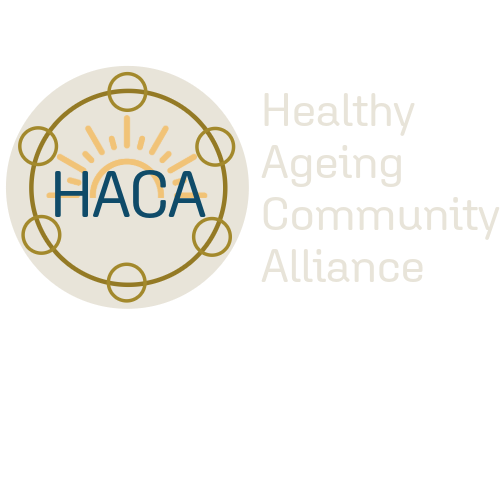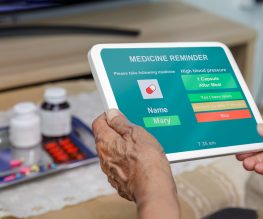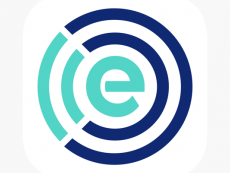What is digital health assistive technology?
HACA Researchers are working together to deliver bespoke services to support clients to live independently in their homes and comfortably within their communities.
Remote and regional communities in QLD face very specific healthcare problems and therefore need tailored and considered healthcare solutions. In this video Dr Dana Dermody explains what digital health assistive technology and smart homes are and how we can implement them to help ourselves and our loved ones stay living independently.
Latest digital health assistive technology
With so many different ways to find info online, it can sometimes be hard to know where to go to first. Here we have collated the most widely used smart home and digital health assistive technology so you can find all you need in one place.

Electric beds
Electric beds that achieve different resting positions.
Benefits of an electric bed
Electric beds can:-
- Assist you to safely get in and out of bed by adjusting the bed to your ideal height for mobility while mitigating falls risk.
- Support an expanded range of bed positions to help with pressure relief and assist you to easily position your legs in and out of the bed.
- Aid pressure redistribution for those who spend longer in bed while enabling you to more comfortably to do things such as eat in bed.
- Improve posture support and ease symptoms of condition such as Sleep Apnoea, reflux, and respiratory issues.
- Increase circulation and minimise fluid retention while relieving aches and pains in lower limbs.
- Can be configured with a static or active companion bed in multiple sizes to allow you to continue sharing a bed with your loved one without impacting your beds functionality.
- Can even provide massage

Smart lighting solutions
Lighting systems controlled via smartphones or voice commands.
Smart home lighting
Intelligent lights that can be turned on and off, adjust intensity, colour and other functions from anywhere via smartphone, voice recognition or programmed automatically. Smart lighting can make ageing in place easier for people with mobility issues and help you save money by reducing your electricity bill.
This set-and-forget convenience is one of the best features of smart lights. You can set certain lights to turn on at a particular time as you wake up and turn off as you leave the house. You can also set your lights to turn on before you arrive home, or use ‘vacation routines’ to turn lights on and off at random intervals to make it seem like you're at home when you're away.
You can buy smart lighting from most home depots including Bunnings. Most smart lights are a no-fuss upgrade to your home – they don't require any rewiring. Simply remove your existing light globes and plug in smart ones. You can swap out all the globes in your house or replace the ones that will be most useful.

Care Apps
Smart phone apps that support you and and your family caregivers.
Caregiver Apps
Caring for a senior loved one is complex. Caregivers are often responsible for medication management, symptom tracking, coordinating care, and more. The tool on carers' mental and physical health can be great as they try and juggle care with the daily pressures of their own lives.
Care Apps can help coordinated care, track symptoms, organise medication management and doctors appointments, aid in care of people living with dementia, and support caregiver mental health.

Smart plugs and outlets
Control electrical devices remotely or set schedules to turn them on and off, making it easier to manage household appliances.
Smart plugs and outlets
Smart plugs and outlets let you turn on and off any appliance that plugs into a standard wall socket.They are connected to the internet and therefore you can remotely control, and/or automate them via your smart phone, and by virtue, whatever is plugged into them.
Smart plugs can secure your garage, remotely restart your router, turn off appliances that have been left on by accident and even help you cut your energy bill by turning off appliances when not in use. They are one of the cheapest smart devices that aid with dementia care and allow you to monitor appliance use and keep your loved one safe.
Smart plugs and outlets are widely available and you can buy them from Amazon, Officeworks and other home stores.

Smart home assistants
Hands-free control over other smart devices, help set reminders, play music, and make calls, through simple voice commands.

Fall detection
Wearables with an emergency button that connects the user to the caregiver, a monitoring center or emergency contacts.
Fall detection

Fall detection alarms come in the form of watches or pendants and trigger an alarm when they detect rapid movement from a trip or fall. When the alarm is triggered it sends an emergency alert to preset mobile phone numbers. Many personal alarms also perform other functions such as location tracking, automated location updates, two way communication and lack of movement detection.
Australian Carers Guide offer great advice on what to consider when buying a fall detection device. You can access their page below.

GPS trackers
Provide peace of mind for family members to easily track your loved one with dementia with GPS tracking and phone alerts.
GPS trackers
Wandering is a prevalent behaviour associated with dementia and can lead patients to become lost, disoriented, and even place themselves in dangerous situations. As dementia symptoms progress, worsening memory loss, confusion, agitation, and disorientation can all lead to wandering.
In recent years GPS tracking devices for dementia patients have become increasingly popular. These devices can provide peace of mind for caregivers and families, ensuring that their loved ones can be located quickly and safely in case of wandering. GPS trackers can also help build confidence and independence in dementia patients, allowing them to continue participating in activities and socialising with others while minimising the risk of getting lost.
There are a range of devices on the market and they come in a variety of wearable forms:- wrist watches, pendants and waist belt attachments. It is important to consider comfort, range and battery life when finding the right one for you or your loved one.
Prices range between 300AUD-500AUD. Some of the more advanced tech like the Safe-Life Medical Alarm 4G provides real-time tracking and an SOS button for emergencies and include fall detection technology, which can automatically alert caregivers if the patient experiences a fall. Additionally, these devices features two-way communication, allowing for constant contact between the patient and caregiver.
Digital health assistive smart homes
SMART HOMES TAILORED FOR AGEING IN PLACE
Being able to live independently in our own homes, that we have often worked our lives to pay for, is a desire that all of us share.
Just as we renovate our homes to fit our personal tastes and family needs throughout our lives, why don’t we adapt our homes to our specific health needs as we get older? Health Assistive Smart Homes aim to do just this.
INTEGRATING HEALTH CARE INTO THE HOME
Most of us use many aspects of smart home technology already. A smart home is just a home equipped with devices that are connected to the internet.
Just as we have home security alarms that can alert us and police of a break-in, we can also have devices that monitor our health and alert local healthcare services if necessary.
PREVENTING A HEALTH CRISIS
Knowing when an incident has happened is not enough. Researchers, healthcare professionals want to predict and then prevent health care crises.
Researchers and healthcare professionals at UniSC are combining their expertise in healthy ageing care and big data analysis to use SMART home sensor data to also recognise and detect decline in our health. The team not only want to know when a health incident has occurred, such as a fall at home, but be able to predict and therefore prevent it! With this knowledge they can provide alerts to family caregivers or medical service providers. Clinical healthcare services can then implement early interventions prior to a health crisis. This will enable us to stay living in our homes independently for longer.
Watch the video to hear Laurel's first hand experience with living with Smart Home Technology
Laurel lives at home in the country with her dog and wants to do so for as long as possible. Laurel was our first test case. We installed 5 Smart Home sensors in her home so she can keep living independently. She has found the experience to be a positive one and feels the technology provides a sense of security.
How can we help you?
If you are looking for help with independent living for you or a loved one and would like to know more about our services pop in, call us or send us an email and one of our team will be happy to help.
Address
Healthy Ageing Hub
UniSC Gympie
71 Cartwright Road
Gympie, Queensland, 4570
Phone
+61 7 5456 5800
healthyageinghub@usc.edu.au






